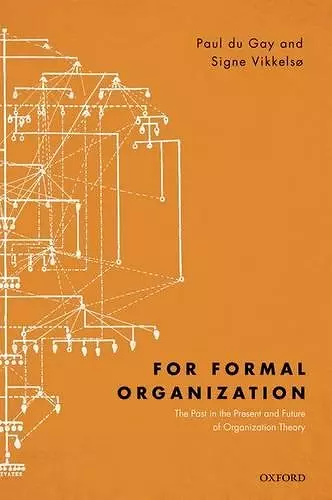For Formal Organization
The Past in the Present and Future of Organization Theory
Paul Du Gay author Signe Vikkelsø author
Format:Hardback
Publisher:Oxford University Press
Published:24th Nov '16
Currently unavailable, and unfortunately no date known when it will be back

This book focuses on the state of Organization Theory, its purpose, object, and practical relevance. In recent years, disquiet has mounted within the field of organizational analysis, broadly defined, about the overly theoretical and a-or anti-organizational state of Organization Theory and its consequent lack of practical purchase, not least in the light of pressing economic, social and political concerns that are often profoundly organizational in nature. The book argues that predominant contemporary modes of theorising within the field, and in particular the stance associated with them, have had the effect of occluding and dissolving Organization Theory's core object - formal organization - and, as a consequence, dissipating its practical focus and reach. The book seeks to contribute to the goal of reviving Organization Theory as a practical science of organizing and rehabilitating its core object -formal organization - through a re-examination and re-assessment of the outlook, comportment and attitude - stance - animating its classical antecedents. This ambition is double edged. For not only does it seek to revive Organization Theory through reconnecting it with the practical orientation framing classical organizational analysis, it also seeks to indicate how the historic products of that orientation or stance still have considerable traction for analysing and intervening in contemporary matters of organizational concern. Not least, this 'classical organizational stance' provides those who adopt it with a method with which to orient themselves both in formal organizational thought and in formal organizational life. It furnishes them with an ethos combining both practical rationality and ethical seriousness. In this sense the book suggest itself both as a guide to doing Organizational analysis and doing practical organization
this is an important book which pursues its thesis with passion, erudition and lucidity, seeking to restore formal organization as the proper object of our discipline and the guiding principle for organizational action. It demands to be read attentively and is the kind of monograph that restores one's faith in the willingness of some scholars today to engage with the big questions facing the discipline. It especially demands to be taken seriously as an attempt to restore formal organization as a defence against arbitrary executive power, hype and pseudo-charisma. * Yiannis Gabriel, Organization Studies *
This book really does need to be widely read. It is a thoroughly enlightening cultural account, throwing its illuminations upon many of the habits of thought that pervade academic, popular and government discourse. * Marilyn Strathern, Journal of Cultural Economy *
Organization theory has suffered recently from justifiable criticisms of being monotheistically consumed by overly abstract theories that deny managerial agency and have contributed to its' growing irrelevance. Paul du Gay and Signe Vikkelso have written an important book that offers salvation. For Formal Organization offers a thoughtful realignment of organization theory. Using classic texts and practical contemporary questions the authors (finally) present a compelling argument for why we need more organization theory. This is an absolutely marvellous book. * Roy Suddaby, Professor and Winspear Chair, Peter B. Gustavson School of Business, University of Victoria *
A work of stunning originality and yet paradoxically a reminder of the forgotten virtues and verities of classical organization theory. In this provocative book du Gay and Vikkelsø navigate a way out of many of the blind alleys of much recent work in the field. Lucid and scholarly, it deserves to become a landmark contribution to organization theory in the 21st century. * Christopher Grey, Professor of Organization Studies at Royal Holloway, University of London *
This book fundamentally questions the direction of intellectual travel that organization theory has followed over the last half-century. By mounting a direct and sustained challenge to the, now dominant, 'metaphysical stance' and the theories it has legitimated, du Gay and Vikkelso offer a very different and distinctive conception of how 'organization' should be studied and practiced to that promulgated by new orthodoxies such as neo-institutional theory. * Mike Reed, Emeritus Professor of Organizational Analysis, Cardiff Business School *
Early theories of organization had a practical aim of getting things done. This practical focus has long been displaced by a more metaphysical approach, at a cost of losing formal organization as an object of study. Du Gay and Vikkelso challenge us to recover the practical focus of organization theory for a world that increasingly needs what organization theory has to offer. * Gerald F. Davis, Gilbert and Ruth Whitaker Professor of Business Administration at The University of Michigan and author of The Vanishing American Corporation *
For Formal Organization offers a detailed account of the need to approach Organization Theory from a formal point of view. The authors explain in minute detail the consequences of ignoring organizations' empirical (legal) reality. They show that the dominant metaphysical stance in Organization Theory leads to the creation of elaborate theoretical simulacra (such as the 'nexus of contracts' approach, or 'institutional fields') deemed to better represent reality than the formal view of organizations. * Jean-Philippe Robe, SciencesPo Law School *
ISBN: 9780198705123
Dimensions: 241mm x 160mm x 18mm
Weight: 494g
222 pages